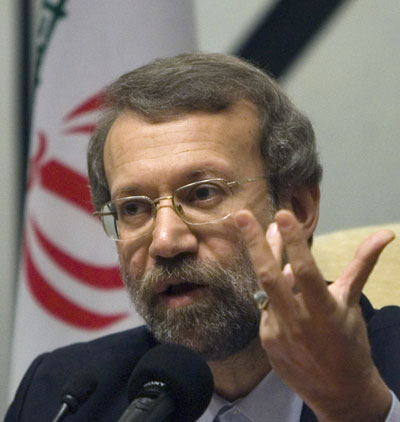Iran's atomic negotiator Larijani resigns
Updated: 2007-10-20 17:52
|
|
TEHRAN - Chief nuclear negotiator Ali Larijani, Iran's main contact with the West over Tehran's atomic programme, has resigned, the government said on Saturday.
His shock decision exposed a rift over tactics with President Mahmoud Ahmadinejad, who accepted his resignation and has taken a hardline approach in Iran's long-running stand-off with the West, analysts said.
A government spokesman said there would be no change in nuclear policy. Saeed Jalili, deputy foreign minister for European and American affairs, was expected to replace Larijani, the official IRNA news agency said.
"Larijani has resigned due to personal reasons, but this does not mean changes in policies and programmes," said government spokesman Gholamhossein Elham.
The West fears Tehran wants to build atomic bombs and has imposed two sets of sanctions through the United Nations. Tehran insists it wants only to produce electricity.
Larijani, secretary of Iran's Supreme National Security Council and chief nuclear negotiator since 2005, had been set to meet EU foreign policy chief Javier Solana in Rome on Tuesday for more discussions about Iran's nuclear ambitions.
European officials say Larijani has long had difficulty in getting the Iranian establishment to support his negotiating strategy.
Iranian analysts have said Larijani had differences with Ahmadinejad over tactics although both oppose halting the nuclear programme in the face of increasing Western concern and threats of more sanctions.
One analyst said Larijani's departure and the appointment of Jalili, viewed as close to the president, suggested the growing ascendancy of hardline voices opposed to a more pragmatic line, which he said Larijani backed.
Major powers have agreed to delay new sanctions until November. They want to see if Iran's deal with U.N. inspectors of the International Atomic Energy Agency (IAEA) about Tehran's intentions yields results and to await a report by Solana.
Washington has refused to rule out the use of force if diplomacy fails to resolve the dispute. Russia supports "direct dialogue" with Tehran and President Vladimir Putin said this week he saw no evidence Iran's programme had military aims.
No Obstacle
Elham, quoted by ISNA, said Larijani's replacement was expected to meet Solana as planned and he did not rule out Larijani attending the talks.
"Despite Larijani's resignation, there will be no change in the council's programme and the new secretary will meet Javier Solana," he said. "There is no obstacle for Mr Larijani's presence in the talks."
And an EU spokeswoman said on Saturday that nuclear talks between the European Union and Iran will go ahead in Rome on Tuesday despite the resignation of Tehran's top negotiator.
EU foreign policy chief Javier Solana will meet Iran's representative replacing Tehran's top negotiator, Ali Larijani, said Cristina Gallach, Solana's spokeswoman.
"We have just spoken to the Iranians. Solana is keeping to his plan to travel to Rome on Tuesday and will meet whatever senior negotiator the Iranians send," she said.
The final say in Iran in all matters of state, including nuclear policy, lies with Supreme Leader Ayatollah Ali Khamenei. Analysts say he tends to look for a consensus among several different political camps to reach decisions.
"This (Larijani's resignation) will show that the hardline position, the defiant position of Iran will continue and there will not be much chance of any change in the Iranian position," said one Iranian analyst who declined to be named.
Larijani may have felt he nothing more to offer in talks with Solana, the analyst said. "The president left no more room for Larijani to manoeuvre and negotiate."
Ahmadinejad, whose rhetoric about the nuclear issue has angered Western governments, has said Iran's nuclear file is closed, though Iran is ready to answer outstanding questions from the IAEA about its programme.
The United Nations has demanded Iran suspend uranium enrichment, a process which can be used to make fuel for power plants or, if Iran wanted, material for warheads.
Iran has repeatedly refused to comply. It has turned a cold shoulder to other mooted proposals such as a "timeout" where Iran would stop expanding its enrichment work in return for the West halting moves to impose more sanctions.
"The IAEA is working with a group of technical counterparts in Iran," a spokesperson for the International Atomic Energy Agency said on Saturday, declining to be named or to comment any further.
|
|
|
||
|
||
|
|
|
|
